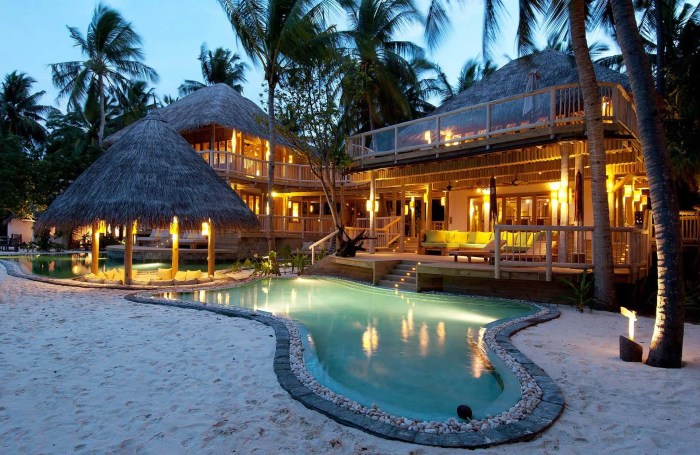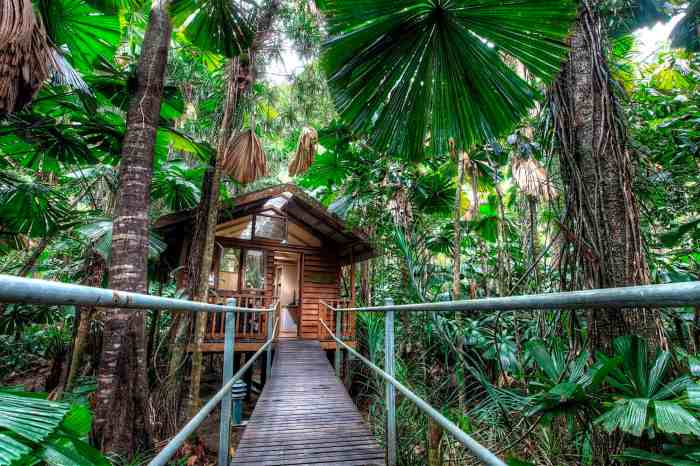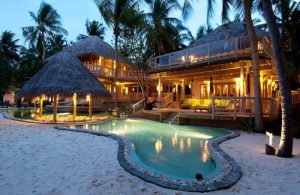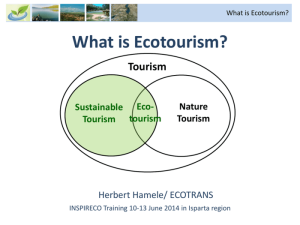
As Ecotourism Lodges and Resorts takes center stage, this opening passage beckons readers with casual formal language style into a world crafted with good knowledge, ensuring a reading experience that is both absorbing and distinctly original.
Ecotourism Lodges and Resorts offer a unique blend of sustainable travel and comfortable accommodations, making them an ideal choice for eco-conscious travelers seeking enriching experiences in harmony with nature.
Ecotourism

Ecotourism is a form of tourism that focuses on responsible travel to natural areas while conserving the environment and improving the well-being of local people. It is guided by principles that aim to minimize the negative impacts of tourism on the environment and promote conservation efforts.
Importance of Ecotourism in Protecting the Environment
Ecotourism plays a crucial role in protecting the environment by raising awareness about conservation, supporting local conservation projects, and providing sustainable livelihoods for communities living in and around natural areas. This form of tourism helps in preserving biodiversity, protecting endangered species, and maintaining the ecological balance of fragile ecosystems.
How Ecotourism Differs from Traditional Tourism
- Ecotourism prioritizes sustainability, conservation, and community involvement, while traditional tourism often focuses on profit-making and mass tourism.
- Ecotourism promotes low-impact travel practices and respect for nature, whereas traditional tourism may lead to overdevelopment, pollution, and habitat destruction.
- Ecotourism aims to educate travelers about the importance of environmental conservation and cultural preservation, while traditional tourism may overlook these aspects in favor of commercial interests.
Ecotourism Lodges and Resorts
Ecotourism lodges and resorts are accommodations that are designed and operated with a focus on sustainability and environmental conservation. These establishments aim to minimize their impact on the surrounding ecosystem while providing guests with unique nature-based experiences.
Key Features of Ecotourism Lodges and Resorts
- Use of renewable energy sources such as solar or wind power
- Implementation of water conservation practices
- Support for local communities and economies
- Protection and preservation of natural habitats and wildlife
- Education programs for guests on environmental conservation
Comparison with Conventional Accommodations
Ecotourism lodges and resorts differ from conventional accommodations in their commitment to sustainable practices and conservation efforts. While traditional resorts may focus solely on luxury and comfort, ecotourism establishments prioritize environmental responsibility and the promotion of eco-friendly behaviors among guests. This shift in focus allows visitors to connect with nature in a more meaningful and respectful way, fostering a deeper appreciation for the natural world.
Sustainable Practices
Ecotourism lodges and resorts often implement a variety of sustainable practices to minimize their environmental impact and promote conservation efforts. By adopting eco-friendly initiatives, these establishments not only contribute to the preservation of natural resources but also enhance the overall guest experience.
Renewable Energy Use
One common sustainable practice in ecotourism lodges and resorts is the utilization of renewable energy sources such as solar power, wind energy, or hydroelectric power. By harnessing these clean energy sources, establishments can significantly reduce their carbon footprint and reliance on non-renewable resources. This not only benefits the environment but also helps in reducing operating costs in the long run.
Waste Reduction
Another key sustainable practice is waste reduction and management. Ecotourism lodges and resorts often implement recycling programs, composting initiatives, and proper waste disposal methods to minimize the amount of waste generated and sent to landfills. By encouraging guests to participate in these programs, establishments can further promote environmentally responsible practices and raise awareness about the importance of waste reduction.
Benefits of Sustainable Practices
The adoption of sustainable practices in ecotourism lodges and resorts offers numerous benefits, both for the environment and the business itself. By reducing energy consumption, minimizing waste, and promoting conservation efforts, establishments can enhance their reputation as environmentally conscious destinations. This, in turn, attracts eco-conscious travelers who prefer to support businesses that prioritize sustainability. Additionally, implementing sustainable practices can lead to cost savings, improved resource efficiency, and long-term sustainability in the face of environmental challenges.
Wildlife Conservation

Ecotourism lodges and resorts play a crucial role in promoting wildlife conservation by providing financial support for conservation efforts and raising awareness among visitors about the importance of protecting local wildlife habitats.
Success Stories in Wildlife Conservation
- One success story is the partnership between a lodge in Africa and a local conservation organization to protect endangered rhinos. The lodge contributes a percentage of its profits to anti-poaching patrols and community education programs.
- Another example is a resort in Costa Rica working with researchers to monitor and protect sea turtle nesting sites. Through ecotourism activities, guests have the opportunity to witness these conservation efforts firsthand.
Challenges and Ethical Considerations
- One of the main challenges in wildlife conservation within ecotourism is finding a balance between allowing visitors to observe wildlife without causing disturbance or stress to the animals.
- Ethical considerations include ensuring that conservation efforts are sustainable and benefit both wildlife and local communities in the long term. Lodges and resorts must work closely with conservation experts to implement responsible practices.
Community Engagement
Community engagement is a crucial aspect of ecotourism initiatives as it fosters a sense of ownership and responsibility among local residents towards conservation efforts and sustainable practices.
Supporting Local Communities
- Providing employment opportunities for community members, such as hiring locals for various roles within the lodge or resort.
- Supporting local businesses by sourcing food and goods locally, thereby contributing to the economic growth of the community.
- Investing in education and training programs for locals to enhance their skills and empower them for future opportunities.
Positive Impacts of Community Engagement
- Enhanced cultural exchange between tourists and locals, leading to a richer experience for visitors and a deeper understanding of the destination.
- Improved conservation efforts as locals become stewards of their own environment, actively participating in wildlife protection and habitat preservation.
- Boosting local economies and reducing dependency on external sources, creating a more sustainable and resilient community.
In conclusion, Ecotourism Lodges and Resorts stand as beacons of responsible tourism, offering a glimpse into a world where conservation meets comfort, and where guests can leave a positive impact on the environment and local communities through their travel choices.
Top FAQs
What sets ecotourism lodges and resorts apart from traditional accommodations?
Ecotourism lodges and resorts prioritize environmental conservation, sustainability, and community involvement, offering guests a chance to experience nature responsibly.
How do ecotourism lodges contribute to wildlife conservation?
Ecotourism lodges support wildlife conservation by promoting awareness, funding conservation projects, and implementing practices that protect local ecosystems.
Are ecotourism lodges and resorts more expensive than traditional hotels?
While prices may vary, ecotourism lodges and resorts often prioritize sustainability and unique experiences over luxury, offering a different value proposition to guests.





